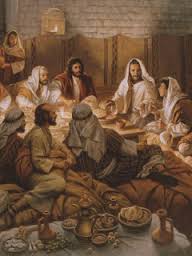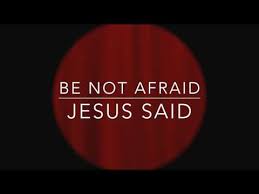
-25-06-2023-
Twelfth Sunday in Ordinary Time
Gospel Text: Matthew 10:26-33
 vs.26 Jesus said to his apostles: “Do not be afraid. For everything that is now covered will be uncovered, and everything now hidden will be made clear.
vs.26 Jesus said to his apostles: “Do not be afraid. For everything that is now covered will be uncovered, and everything now hidden will be made clear.
vs.27 What I say to you in the dark, tell in the daylight; what you hear in whispers, proclaim from the housetops.
vs.28 Do not be afraid of those who kill the body but cannot kill the soul; fear him rather who can destroy both body and soul in hell.
vs.29 Can you not buy two sparrows for a penny? And yet not one falls to the ground without your Father knowing.
vs.30 Why, every hair on your head has been counted.
vs.31 So there is no need to be afraid; you are worth more than hundreds of sparrows.
vs.32 So if anyone declares himself for me in the presence of men, I will declare myself for him in the presence of my Father in heaven.
vs.33 But the one who disowns me in the presence of men, I will disown in the presence of my Father in heaven.”
******************************************
We have four sets of homily notes to choose from.
Please click on the one required or scroll down the page.
We have four sets of homily notes to choose from. Please scroll down the page for the desired one.
Michel DeVerteuil : A Spiritan Priest, Specialist in Lectio Divina
Thomas O’Loughlin: Professor of Hist Theol, Uni of Nottingham.
John Littleton: Director of the Priory Institute, Dublin 24
Donal Neary SJ: Editor of The Sacred Heart Messenger
*******************************************************
Michel de Verteuil
Lectio Divina with the Sunday Gospels – Year A
www.columba.ie
General Comments
With today’s passage we are still with the “continuous reading” of St Matthew’s gospel, although it is not strictly continuous since last week’s reading ended with verse 6 of chapter 10, and this week’s starts with verse 26 of the same chapter. Jesus is still in Galilee however, continuing to lay the foundation for his great work of transforming the ancestral religion of the Jews and eventually all religion.
The passage is a series of sayings, an opportunity to remember that according to the lectio divina method the sayings of Jesus, like all other bible passages, must not be read in a vacuum, hanging in mid-air as it were, but as historical events, “fulfilled” in subsequent history. It is significant that the lectionary reading starts, not with the sayings themselves, but with “Jesus said to his apostles…” To be true to the text itself then, we must situate this event both in Jesus’ context and in ours, asking ourselves where he is uttering these sayings today? to whom? why?
The sayings are in metaphorical language and therefore open to different interpretations. We are not free to interpret them as we like however; our interpretation must be guided by the original historical context.
The context here is that Jesus has just warned his disciples that they will be persecuted as he was (verses 24 and 25). We interpret the sayings, therefore, as words of encouragement addressed to those who are being unfairly condemned. In verse 26, for example, “do not be afraid” means “do not be afraid of those who are condemning you unfairly.”
Each saying has its movement which we must enter into.
Verse 26 is in two stages. In the first, the disciples are misunderstood because some truth about themselves is “covered up” and “hidden” e.g., the fact that they are being honest, are protecting someone’s good name, are not sure what they should say.
The second stage is the moment of vindication – the truth is “uncovered” and “made clear.”
We celebrate:
– the Jesus people (including ourselves) who encourage others with words like this at times of discouragement,
– moments when we feel at peace because we trusted that the truth would be uncovered in God’s good time.
In verse 27 the perspective changes. The passivity of the previous verse is gone; Jesus’ disciples are now active, speaking out openly and self-confidently. “What I say to you in the dark” and “what you hear in whispers” can be interpreted in two ways.
They can mean:
– what many are saying in secret (“in whispers”) because they are reluctant to speak out, will eventually come to the light;
– we come to deep truth (the kind worth preaching from housetops)
only if we take time to hear what is said in “whispers.”
Verse 28 can also be interpreted in two ways depending on the meaning of “he who can destroy both body and soul in hell.”
– It can refer to God, in which case Jesus is saying our only concern is for God’s judgement; we don’t have to be afraid of human judgements.
– It can refer to people, in which case Jesus is warning us against those who can break our spirits, wear us down, erode our self-confidence or our determination.
– When did we make the journey to this insight? Who is the Jesus who is saying this to the world?
Verses 29 to 31 become very touching if we enter into their movement.
– A first stage when people are feeling that no one (not even God) cares about what happens to them.
– A second stage when Jesus arrives on the scene and speaks these words.
Verses 32 and 33 are often misinterpreted. The secret of interpreting a bible passage correctly lies in following a correct method – a good method leads to a good interpretation. This passage is therefore an opportunity to look at method.
 I suggest four aspects to look at.
I suggest four aspects to look at.
– The first criterion for knowing that we have read a passage right is Jesus’ saying, “by their fruits you shall know them.“ If at the end of our reading we feel fearful or lacking in self-confidence, our interpretation has been wrong. So too if Jesus comes across as harsh and unforgiving”
– The language is poetry – imaginative, not rational, teaching. We must be guided by our feelings and get the “feel” of the passage.
– As always with lectio divina, we start with experience. Jesus must remind us of a great person who touched our lives deeply, someone straight-forward but compassionate, who does not let us give in to self-pity but at the same time does not crush us – someone who lifts us so that we act from the best in us.
– The context here is still Jesus speaking a word of encouragement to those who are being unfairly treated. The passage then must mean something like: “Don’t worry what people are saying about you. As long as you are being true to your convictions you are being affirmed in the presence of God in heaven. On the other hand, don’t hide behind the fact that you are being persecuted. Be honest with yourself, don’t fool around with the truth.” Who has spoken to you (or to your community) like that? Who is speaking like that in the world today?
“As the setting sun brings out the stars, so great principles are found to shine out which are hailed by men and women of various religions when infidelity prevails.” … Cardinal Newman
Lord, we often feel discouraged in our attempts to be good
and to make our country a more human place.
There is so much envy in the world and in ourselves, so much lust, greed, desire for power, whereas trust and selflessness are so rare and vulnerable.
Help us not to be afraid.
Teach us to trust people, ourselves and history, to remember that true goodness is covered over by evil and you will uncover it;
that love is hidden deep under all the selfishness and you will bring it to light.
“The captains, merchant bankers, eminent men of many letters distinguished civil servants, chairmen of many committees industrial lords and petty contractors, all go into the dark.” …T.S. Eliot
Forgive us, Lord, for the times when we become self-righteous,
forgetting that we are covering up many sins which will one day be uncovered and hiding impure motives which will one day be brought to light.
“The surface of Scripture and the form of nature both serve to clothe Christ, they are two veils that mask the radiance of his faith while at the same time reflecting his beauty.” … John Scotus Eriugena
 Lord, people are dazzled by great achievements, large crowds and impressive buildings.
Lord, people are dazzled by great achievements, large crowds and impressive buildings.
We pray that your Church will be for our society what Jesus was for his: free enough to appreciate the true greatness that is covered over in society, the real virtue that is hidden because it meets with no success.
“To understand Scripture, we must stop acting like mere spectators.” …Karl Barth
Lord, we pray for preachers of the Gospel.
Don’t let them become superficial in their preaching,
to look for the limelight or for quick results.
Teach them to be true to the dark aspects of life
for it is there that they will learn what they must tell in the daylight.
Help them to be comfortable with silence,
because it is what they hear in whispers that they must proclaim on the housetops.
Lord, we remember with gratitude the great people we have known:
– world famous figures like Gandhi, Martin Luther King and Archbishop Romero;
– members of our families;
– leaders in our communities.
We thank you that they were never afraid of what could kill their bodies alone
– prison, torture or the assassin’s bullet;
– unpopularity, failure, or losing their jobs.
But they were mortally afraid of other things
– of insincerity,
– of being unfaithful to themselves
– of whatever could destroy their souls.
“Hope is the thing with feathers that perches in the soul and sings the tune without the words and never stops at all.” …Emily Dickinson
 Lord, we remember today the many people who are feeling that no one cares:
Lord, we remember today the many people who are feeling that no one cares:
– others only see their failures, not how hard they have tried;
– people think they have no problems, when in fact they are heavily burdened.
They feel abandoned like a sparrow that has fallen to the ground while a hundred others are flying overhead.
Send them someone who will be Jesus for them, telling them that every hair on their heads has been carefully counted.
“Every single thing we do, provided it has a good and constructive purpose, is helping our world grow towards its common goal.” …Leonard Cheshire
Lord, when we take a stand on principle we come across as impractical or foolish.
Help us to fear nothing so much as to be disowned in your presence,
and keep as our goal the following of Jesus rather than the approval of society.
********************************************
Thomas O’Loughlin
Liturgical Resources for the Year of Matthew
www.columba.ie
Introduction to the Celebration
We are here because we believe that God the Father loves us, and loves us with such care that we can say/ in the words of today’s gospel/ that he even knows the number of hairs on our head. Let us reflect on that love for a moment.
Homily Notes
1. There are several notes of fear in today’s gospel. There is the fear that what they – the Matthaean churches represented by ‘The Twelve’ – are involved in as Christians is unclear and hidden from the eyes of the ordinary people around them, yet they are expected to proclaim it from the housetops. There is the fear of those who are persecuting the group – they must rather fear God who can destroy them utterly than the earthly persecutor who can only destroy their bodies. This seems cold comfort. You may be worth ‘hundreds of sparrows/ but there is still the threat of one’s body being killed. Then there is the fear that if the community do not witness to Jesus before others, then he will disown them before the Father. This seems to offer support to the old conundrum: ‘The Christian way is a free and joyful choice; but if you do not choose it, you will be condemned to hell for your refusal.’
2. This passage also brings before us the fact that it was part of the primitive kerygma that there is a genuine ultimate fear of God’s justice and, so, of his punishment. Yet ‘preaching hell fire and damnation’ is not a strategy that is in line with the overall thrust of the good news. The problem arises from the fact that we want a consistent ‘message’, yet there is no such consistency to be derived from the surviving early Christian texts. Many people from many different branches of Judaism became followers of Jesus, and so there were many flavours of Christian belief, emphasis, and lifestyle. Here we see traditions preserved that probably reflect the sort of preaching we see with John the Baptist: there is a crunch coming and God will mete out his punishments, while the more characteristic ‘message of Jesus is that there is a crunch coming so form a community of love and God will mete out his mercies. These various strands came together in the traditions of the churches and left a mosaic of positions that has defied nearly two thousand years of attempts at systematisation in catechisms and doctrinal systems.
 3. So can these statements be presented today in such a way that they do not become the basis for a gospel of fear? That is the task we face as preachers: accommodating these particular perceptions within a larger picture of what we say about the Father on the basis of what Jesus taught and did.
3. So can these statements be presented today in such a way that they do not become the basis for a gospel of fear? That is the task we face as preachers: accommodating these particular perceptions within a larger picture of what we say about the Father on the basis of what Jesus taught and did.
4. Jesus formed a people and presented God relating to us as members of that new people not as isolated individuals. This is seen in this text in that it is addressed to The Twelve – a unified highly identifiable group – not to twelve individuals who just happened to be together. This warning of fear must be to us as a community/ not to each individually. So the question is: are we as a community sufficiently serious about the message of God in Christ; do we realise the importance of the message entrusted to us; do we realise its urgency? On the whole as a community we fail in this and the evidence is all around us: we live in fractured communities/ we often condone injustice/ We know that there is poverty and suffering in the world – and yet we do nothing. We may Tear for our souls,’ but a glance at a news bulletin shows that most Christian communities are not too fearful for other people’s bodies.
5. So the task of the community is to act together to bear witness to the love and care of God before our fellow human beings. If we seek forgiveness from God, we must forgive fellow humans (the Our Father); if we seek love and care from God, we must offer love and care to others. So can this community organise itself to that it can witness before men and women as caring for those suffering from injustice, hatred, sickness, the exploitation of the environment? If the community can be so seen as the body of Christ, then it can stand as the body of Christ in the presence of the Father.
******************************************
John Litteton
Journeying through the Year of Matthew
www.Columba.ie
Gospel Reflection
 ‘Do not be afraid‘ (Mt 10:26). Where have we heard these words before? They are quite familiar to most of us because they have been quoted often by preachers and commentators since the death of Pope John Paul II in 2005. A recurrent theme from the beginning of his pontificate in 1978 was: Do not be afraid.
‘Do not be afraid‘ (Mt 10:26). Where have we heard these words before? They are quite familiar to most of us because they have been quoted often by preachers and commentators since the death of Pope John Paul II in 2005. A recurrent theme from the beginning of his pontificate in 1978 was: Do not be afraid.
This was also John Paul’s message to Catholics and to the entire world as he passed from this life to eternal life. His entire life, and especially his final illness, demonstrated that he himself was fearless because of his absolute faith and trust in the person and saving message of Jesus Christ. And he urged everyone else to have the same conviction.
John Paul was not the first person to say ‘Do not be afraid’.
In the Old Testament, God said it to the prophets.
The angel Gabriel also spoke these words to Mary before telling her that she would become the Mother of the Saviour of the world.
Years later, Jesus instructed the Twelve not to be afraid when he commissioned them to continue his work of proclaiming the Good News. The Good News was essentially that the kingdom of heaven was close and that people must undergo conversion from their sinful lives.
Jesus knew that this message, when preached and lived by his disciples, would not always be welcomed. The disciples would frequently be ridiculed and rejected, as he had been. Discipleship would indeed be costly because it would require humility and sacrifice. Therefore, Jesus warned them to be convinced about their message and to be confident that God was with them in every situation. He assured them: ‘If anyone declares himself for me in the presence of men, I will declare myself for him in the presence of my Father in heaven’ (Mt 10:32).
Jesus says the same to us. The apostles were not living in easier times than ours. Yet they willingly suffered for the faith, never making excuses to dilute it or compromise its principles. Neither should we, believing that God loves and supports us in every crisis. Faith dispels fear.
As committed disciples, we are duty bound to proclaim the gospel fearlessly and confidently. This is our baptismal obligation. We are required to be prophetic people by speaking the truth at all times. We will frequently experience opposition and alienation because of our Christian beliefs and we will be tempted to abandon our commitment in order to remain popular. However, popularity in this life does not equate with good standing in the next life.
We can learn from the great heritage of our saints who, even in the face of persecution and martyrdom, did not hesitate to remain faithful to Christ and his teaching. They refused to deny him. Fortunately, most of us do not suffer the threat of martyrdom. Instead, we are asked to become fearless witnesses to Christ in all circumstances and to cope in a dignified manner with ridicule in our workplaces or disagreement among friends and colleagues, perhaps even our families. Let us pray that we will have the courage of our convictions and not be afraid.
For meditation
Do not be afraid of those who kill the body but cannot kill the soul; fear him rather who can destroy both body and soul in hell. (Mt 10:28)
************************************************************************
Fr Donal Neary, S.J
Gospel Reflections for the Year of Matthew
www.messenger.ie
Just Trust

Our lives are lightened by people we can trust. We need to trust so much in life. We know the great pain when our trust is shaken by people we thought we could trust — parents/ teachers/ religious superiors/ the church/ friends and more. In the gospel today Jesus addresses that need and grace in our lives. He encourages us to place our trust in those who care for us, and to trust in God who does not want destruction/ but development/ who wants peace among people in all sorts of ways. In what do we trust? Pagola writes: ‘some feel a need to consume more in order to feel secure; and seek a life of entertainment to forget their everyday problems’ (The Gospel According to Matthew/ p. 106). Jesus tells us to trust in God, who would not harm even a hair of our head. He asks and urges us to be people who would not harm another. We are worth this care and love just by being created. Like a parent or grandparent/ or an aunt or uncle/ totally loving a new child before the child is even seen, so God loves each of us. The sight of a starving child brings out our love and a desire to care.
This is linked to the care of God: in this care and trust of each other we find the trust and care of God/ given and received for ‘where there is love, there is God (1 John 3:7).
Just echo the word ‘trust’ as you sit in silence;
let this gift and call of trust fill your being.
Sacred heart of Jesus, I place all my trust in you
************************************************